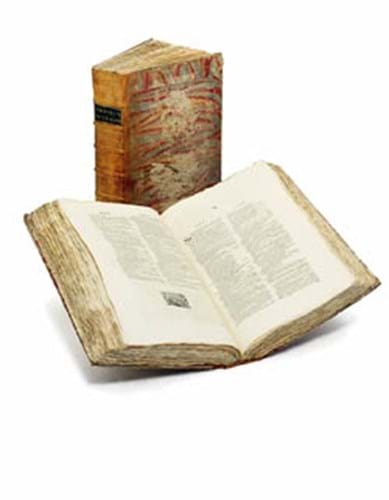
These are the words of the classical scholar and poet Christopher Smart, and the work that so amazed him was the newly published A Dictionary of the English Language by Dr Samuel Johnson
The compilation of what Johnson always referred to as "my book" had been an arduous one, and though he was helped by a succession of amanuenses, working in the spacious garret of his house in Gough Square, its creation has also been described, by the editors of Printing and the Mind of Man, as the most amazing, enduring and endearing one-man feat in the field of lexicography.
The comparable French and Italian dictionaries had been produced by learned societies and had taken far longer to compile. It took Johnson less than 10 years from prospectus to publication on June 14, 1755.
Boswell called it a work of "superior excellence" and "much greater mental labour, than mere Lexicons, or Word Books as the Dutch call them", but it was those words of Smart that best expressed national pride in Johnson's great dictionary. It is undoubtedly his greatest monument, as St. Paul's was Christopher Wren's.
But while it is always known as 'Johnson's Dictionary', it was not to be his financial salvation. The project had been the idea of a group of publishers, booksellers and the Scottish printer, William Strahan, and Johnson had been paid £1575 in advance for his labours.
The work is divided into four parts. The preface on the aims and problems of lexicography is regarded as amongst his finest writing, but the history and grammar sections, which held no interest for him, are largely a re-hash of earlier work. It is the dictionary itself that is his magnificent achievement. In it he codified the spelling of English words and gave full and lucid definitions of meanings - although these are often entertainingly coloured by his High and Tory propensities.
One of his most famous definitions, of course, is that of a lexicographer as a "harmless drudge, that busies himself in tracing the original, and detailing the signification of words", but in later years another man whose name has become forever attached to the word dictionary, Noah Webster, proclaimed that "Johnson's writings had, in philology, the effect which Newton's discoveries had in mathematics".
Johnson's bibliographer, J.D. Fleeman, estimated that as many as half of the 2000 copies originally printed may still be around, but noted that "few copies survive in booksellers' boards, and all such have restored spines, for when standing upright, the contents are too heavy for the binding cords".
The re-appearance at auction of a stunning copy in a wholly unrestored original binding at Christie's on October 27 was always likely to become a defining moment in terms of auction records.
Uncut in original half-sheep and comb-marbled boards, this was the copy that in 1975 was bought from the House of El Dieff for $9000 by Haven O'Moore, and then sold for $60,000 when his spectacular 'Garden' library was dispersed by Sotheby's New York in 1989. This time it was offered as part of Ladislaus von Hoffmann's 'Arcana Collection', and the price was a record £130,000.
The previous best had been the $140,000 (then £94,710) paid for a copy, unusually bound as three volumes in original sheep-backed boards, in the Abel Berland library, sold at Christie's New York in 2001.
Copies not retaining those original bindings are priced very differently.
A hugely successful Sotheby's sale of October 28 saw records tumbling for any number of famous works of English literature, but the copy of Johnson's Dictionary in that sale, while a very fine one and in 18th century half calf and marbled boards, was sold at just £14,000. The fact that it had once belonged to Ross Smith, who in 1919 made the first flight from England to Australia, seemed not to help at all.
By Ian McKay




